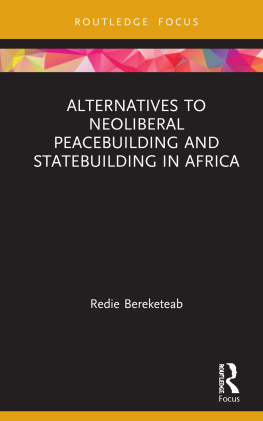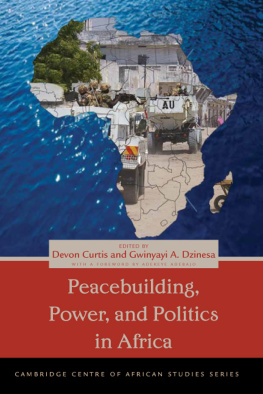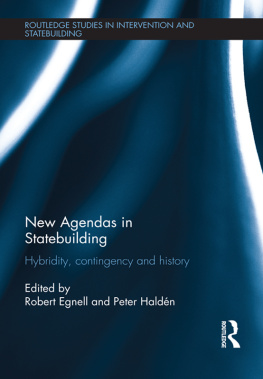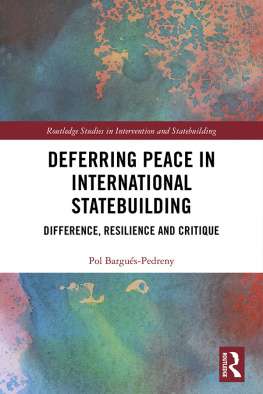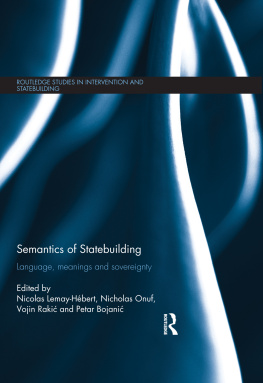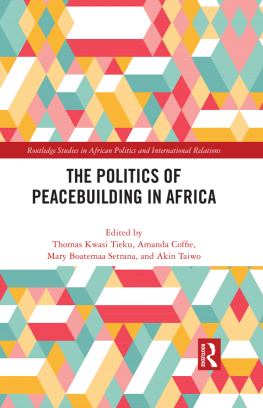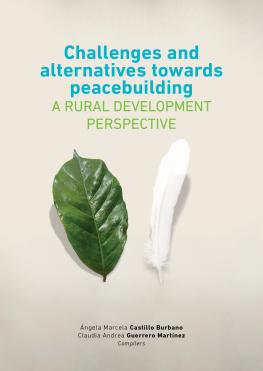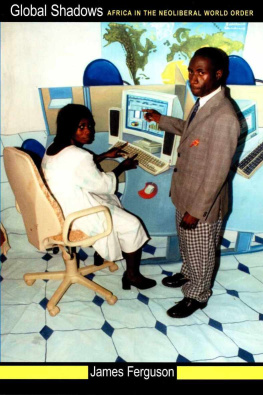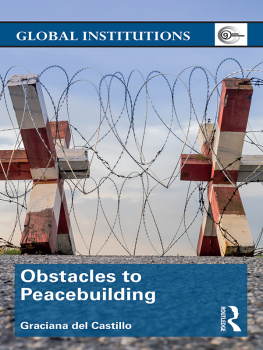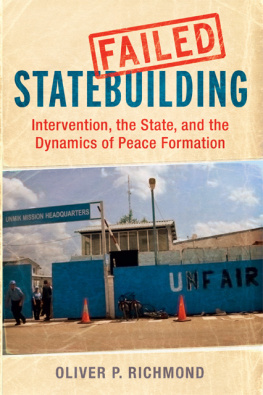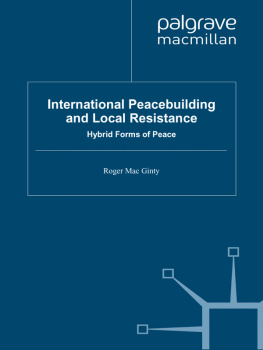Alternatives to Neoliberal Peacebuilding and Statebuilding in Africa
This book critically interrogates the neoliberal peacebuilding and statebuilding model and proposes a popular progressive model centred around the lived realities of African societies.
The neoliberal interventionist model assumed prominence and universal hegemony following the demise of state socialism at the end of the Cold War. However, this book argues that it is a primarily short-term, top-down approach that imposes Western norms and values on conflict and post-conflict societies. By contrast, the popular progressive model espoused by this book is based on stringent examination and analysis of the reality of the socio-economic development, structures, institutions, politics and cultures of developing societies. In doing so, it combines bottom-up and top-down, popular and elite, and long-term evolutionary processes of societal construction as a requisite for enduring peacebuilding and statebuilding.
By comparing and contrasting the dominant neoliberal peacebuilding and statebuilding model with a popular progressive model, the book seeks to empower locals (both elites and masses) to sit in the drivers seat and construct their own societies. As such, it is an important contribution to scholars, activists, policymakers, civil society organisations, NGOs and all those who are concerned with peace, stability and development across Africa and other developing countries.
Redie Bereketeab is Associate Professor of Sociology and Senior Researcher at The Nordic African Institute, Uppsala, Sweden.
Routledge Studies in African Development
African Peacekeeping Training Centres
Socialisation as a Tool for Peace?
Anne Flaspler
Corporate Governance in Tanzania
Ethics and Accountability at the Crossroads
Peter C. Mhando
Economic Dualism in Zimbabwe
From Colonial Rhodesia to Post-Independence
Daniel B. Ndlela
Rethinking Ownership of Development in Africa
T.D Harper-Shipman
African Environmental Crisis
A History of Science for Development
Gufu Oba
Development in Nigeria
Promise on Hold?
Edlyne Eze Anugwom
Mineral Resource Governance and Human Development in Ghana
Felix Danso
Alternatives to Neoliberal Peacebuilding and Statebuilding in Africa
Redie Bereketeab
For more information about this series, please visit: https://www.routledge.com
First published 2021
by Routledge
2 Park Square, Milton Park, Abingdon, Oxon OX14 4RN
and by Routledge
52 Vanderbilt Avenue, New York, NY 10017
Routledge is an imprint of the Taylor & Francis Group, an informa business
2021 Redie Bereketeab
The right of Redie Bereketeab to be identified as author of this work has been asserted by him in accordance with sections 77 and 78 of the Copyright, Designs and Patents Act 1988.
All rights reserved. No part of this book may be reprinted or reproduced or utilised in any form or by any electronic, mechanical, or other means, now known or hereafter invented, including photocopying and recording, or in any information storage or retrieval system, without permission in writing from the publishers.
Trademark notice: Product or corporate names may be trademarks or registered trademarks, and are used only for identification and explanation without intent to infringe.
British Library Cataloguing-in-Publication Data
A catalogue record for this book is available from the British Library
Library of Congress Cataloging-in-Publication Data
Names: Bereketeab, Redie, author.
Title: Alternatives to neoliberal peacebuilding and statebuilding in Africa / Redie Bereketeab.
Other titles: Routledge studies in African development.
Description: Abingdon, Oxon; New York, N.Y.: Routledge, 2021. | Series: Routledge studies in African development | Includes bibliographical references and index.
Identifiers: LCCN 2020019679 (print) | LCCN 2020019680 (ebook) | ISBN 9780367558949 (hardback) | ISBN 9781003095613 (ebook)
Subjects: LCSH: Peace-buildingAfrica. | Nation-buildingAfrica. |
Economic developmentAfrica. | Self-determination, NationalAfrica.
Classification: LCC JZ5584.A35 (print) | LCC JZ5584.A35 (ebook) | DDC 327.172096dc23
LC record available at https://lccn.loc.gov/2020019679
LC ebook record available at https://lccn.loc.gov/2020019680
ISBN: 978-0-367-55894-9 (hbk)
ISBN: 978-1-003-09561-3 (ebk)
Typeset in Times New Roman
by codeMantra
Introduction
Making sense of peacebuilding and statebuilding (PBSB) is a great challenge of our time a time characterised by the omnipresent, yet contested, reign of neoliberalism; a time also characterised by state fragility, crisis, failure and collapse; by terrorism, fundamentalism, extremism and interventionism affecting primarily the global south. The challenge gains additional currency when viewed from the vantage point of the peacebuildingstatebuilding nexus. Following the end of the Cold War which also heralded the collapse of the Soviet-led Eastern bloc and state socialism there was a need to change gear, in order to reconfigure world power and international relations. The reconfiguration spawned the phenomenon that came to be known as the New World Order, indicating the emergence of a hegemonic mono-polar politico-economic global order that was enthusiastically welcomed by the high priests of neoliberalism, such as Francis Fukuyama (1992) and Samuel P. Huntington (1996). This mono-polarity of the politico-economic order was celebrated as the triumph of the West over the East in the ideological struggle, and warranted the declaration of the end of history (Paris, 2010). The triumphalist exhilaration was due to the perception that the West had secured hegemonic world domination. The consequence of the triumphalism, however, became a highly unstable world order.
This chapter seeks to understand PBSB in the era of neoliberalism. The neoliberal era that became dominant following the end of the Cold War and the collapse of state socialism is also characterised by extensive interventionism of big powers, primarily Western in the internal affairs of fragile, non-Western societies. This interventionism was driven by at least three interwoven phenomena. First, although many conflicts were resolved in the wake of the Cold War, many new ones broke out; these went on to engender fragility, failure and even the collapse of many states. Secondly, as a consequence, the failed states were labelled a danger to their own people and the wider world. In addition, they were perceived as fertile ground for the gestation of extremism, fundamentalism and terrorism. The rise of terrorism was, in turn, seen as a threat to Western security and interests, and particularly to those of the USA. Thirdly, the danger and threat perception induced two associated doctrines. One was the need to intervene to repair the failed states that are the sources of danger and threat. This led to the principle of humanitarian intervention in the cause of PBSB under the neoliberal regime. The other doctrine that emerged was that of pre-emptive action wherever the USA deemed it justifiable and felt itself entitled to attack an imagined enemy state before it attacked the USA (Murphy, 2005; Peilouw et al., 2015; Thiessen, 2011).


